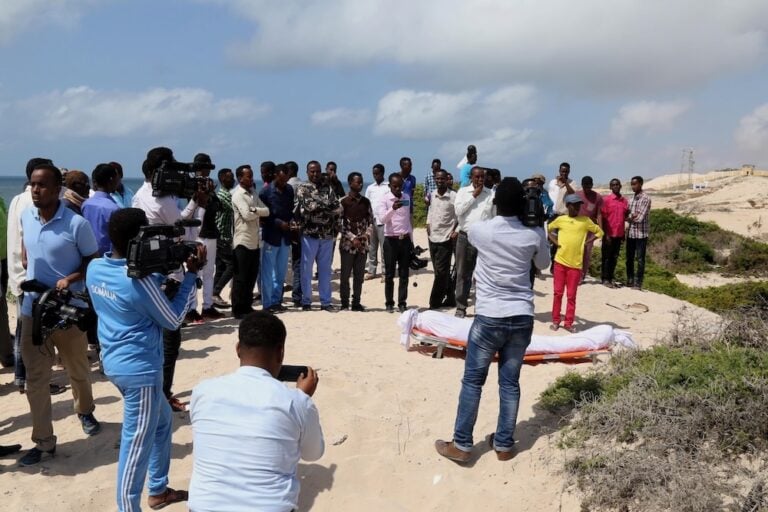"The way the TFG and Al-Shabaab media cover the current conflicts degrades the quality, critique and objectiveness of the media they control," said Omar Faruk Osman, NUSOJ Secretary General.
(NUSOJ/IFEX) – 28 June 2011 – The National Union of Somali Journalists (NUSOJ) is concerned with the increasing political control and manipulation of media outlets in Somalia by both the Transitional Federal Government of Somalia (TFG) and the Al-Shabaab Islamist movement in order to provide powerful propaganda to muster support for their wars.
The government is increasingly using Radio Mogadishu as a propaganda tool not only against Islamic extremists but also political opponents within the TFG with the aim of destroying the reputation of individuals deemed critical of its “political agenda.”
Radio Mogadishu journalists and presenters have been discouraged from reporting on Ministers or parliamentarians who are not politically allied with certain dominant political groups, through the use of the Minister of Information’s powers over Radio Mogadishu. This resulted in the loss of pluralism within the radio, a diminished quality of content and broad representation, all of which have compelled some within the society to believe that it has become a mere propaganda tool.
One senior journalist at TFG’s Radio Mogadishu, who spoke to NUSOJ on condition of anonymity because he may face immediate sacking and danger to his personal security and that of his family, said “We are not allowed to tell the truth, particularly if it is bad for senior government officials and the TFG forces.”
A reporter for Radio Mogadishu says that the TFG forces and Al-Shabaab have been “spreading lies on many occasions and
what they tell us to report doesn’t have to be the truth, so long as it’s desired and sounds plausible to the political network. We are constrained by reporting repetitive and disturbing phrases that distort the truth.”
The Al-Shabaab forces are also forcing radio stations in Mogadishu and the Middle Shabelle region to relay its hateful and extremist campaign programme from Radio Andalus in Kismayu.
Some media outlets in Bakara market were forcefully instructed to relay programmes from Radio Andalus by Al-Shabaab against the government and its leaders.
“The way the TFG and Al-Shabaab media cover the current conflicts degrades the quality, critique and objectiveness of the media they control,” said Omar Faruk Osman, NUSOJ Secretary General.
Journalists have repeatedly expressed fears over their personal security and the uncertainty of their professional future in media houses controlled by the TFG and Al-Shabaab. “I’m very worried about my future after we are used as political fodder,” said one journalist working for an Al-Shabaab allied radio station in Mogadishu.
“Partisan use of the media by both the TFG and Al-Shabaab could endanger the life of journalists. This trend is a danger to press freedom in Somalia,” added Osman.
Another journalist who is also working for Al-Shabaab affiliated FM station stated that they are prohibited from reporting on the other side’s point of view.
Private media journalists explained that both warring sides want to control coverage of private media through “censorship”. “For them, it is paramount to control our work,” said another journalist who does not want to be named for security reasons.
A veteran journalist, who fears being barred from accessing government offices if named, complained that the main challenge faced by the private media in Mogadishu and southern towns is how to have “unfettered and uncensored access to real details and issues.”
“Independent journalists are looked upon more suspiciously by government forces when we go to their press conferences and this starts when they fail to co-opt these journalists,” the veteran journalist added.
“It is most deplorable that a government that claims to be respecting and promoting independent media and the practice of free journalism is trying to restrict and manage which information is presented, and therefore, what reasons are brought forward for its continued fighting with Al-Shabaab,” declared Osman.
The previously mentioned media outlets are also known for their ideological appeals to journalists and the public. Al-Shabaab is known for appealing to journalists to defend their religion and the nation from “traitors” while the TFG is known to make journalists appeal for the defense of the often vague “national interest”.
The news and the content of the programmes of both Radio Mogadishu and Al-Shabaab allied radio stations have the common characteristics of incompleteness, inaccuracy, limited facts and context, and a deliberate intention to bring forward a specific political agenda.


